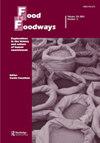“缺失的成分:数字共栖性及其在促进心理健康方面的挑战”
IF 1.1
Q2 ANTHROPOLOGY
引用次数: 0
摘要
摘要在传统的面对面环境中,共栖,即一起吃饭或喝酒的行为,被广泛地与心理健康联系在一起。然而,2019冠状病毒病大流行及其必要的保持身体距离措施促使人们转向数字共享,人们在网上聚集在一起,虚拟地分享食物和饮料。本研究采用一项跨国调查,采用定量和定性方法,调查了数字共生与心理健康之间的关系。研究结果显示,与之前相比,参与数字共享活动后的幸福感水平有所下降。此外,受访者强调了数字共栖的几个显著特征,这些特征解释了为什么它不像面对面的共栖那样与心理健康相关。这些问题包括分享食物和饮料的不同方式、对吃饭声音的担忧、自我意识的增强、与地点有关的问题,以及数字共栖为提供通常由面对面的共栖所产生的社交和情感利益所做的努力。总而言之,我们的研究表明,与面对面的交流相比,数字共栖与不适有关,在促进联系和幸福感方面也存在不足。关键词:数字评论covid -19大流行心理健康披露声明作者声明,本研究是在没有任何可被解释为潜在利益冲突的商业或财务关系的情况下进行的。数据可用性声明数据可在合理要求下提供。本研究没有得到任何资助机构的特别资助。本文章由计算机程序翻译,如有差异,请以英文原文为准。
“Missing ingredients: Digital commensality and its challenges in fostering psychological well-being”
AbstractCommensality, the act of sharing a meal or drink together, has been widely associated with psychological well-being in traditional in-person settings. However, the COVID-19 pandemic and its necessary physical distancing measures have prompted a shift toward digital commensality, where individuals gathered online to virtually share food and beverages. This study investigates the relationship between digital commensality and psychological well-being, using a cross-national survey employing both quantitative and qualitative methods. The findings reveal that individuals reported experiencing lower levels of happiness after engaging in digital commensality compared to before. Moreover, respondents highlighted several notable characteristics of digital commensality that explain why it is not associated with psychological well-being as in-person commensality is. These include different ways of sharing food and drinks, concerns about eating sounds, increased self-consciousness, place-related issues, and the struggle of digital commensality to provide the social and emotional benefits typically generated by in-person commensality. In conclusion, our study suggests that digital commensality is associated with discomfort and falls short in fostering levels of connection and well-being compared to its in-person counterpart.Keywords: Digital commensalityCOVID-19 pandemicpsychological well-being Disclosure statementThe authors declare that the research was conducted in the absence of any commercial or financial relationships that could be construed as a potential conflict of interest.Data availability statementData is available upon reasonable request.Additional informationFundingThis research received no specific grant from any funding agency.
求助全文
通过发布文献求助,成功后即可免费获取论文全文。
去求助
来源期刊

Food and Foodways
ANTHROPOLOGY-
CiteScore
2.20
自引率
0.00%
发文量
16
期刊介绍:
Food and Foodways is a refereed, interdisciplinary, and international journal devoted to publishing original scholarly articles on the history and culture of human nourishment. By reflecting on the role food plays in human relations, this unique journal explores the powerful but often subtle ways in which food has shaped, and shapes, our lives socially, economically, politically, mentally, nutritionally, and morally. Because food is a pervasive social phenomenon, it cannot be approached by any one discipline. We encourage articles that engage dialogue, debate, and exchange across disciplines.
 求助内容:
求助内容: 应助结果提醒方式:
应助结果提醒方式:


